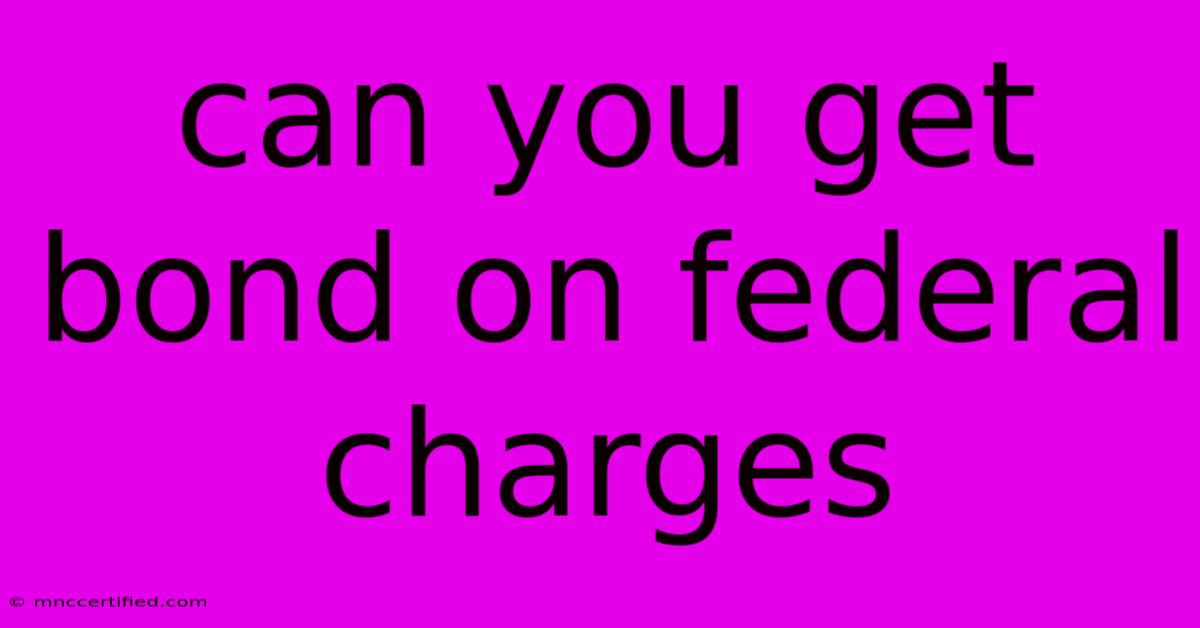Can You Get Bond On Federal Charges

Table of Contents
Can You Get Bond on Federal Charges? Navigating the Complexities of Federal Bail
Being arrested on federal charges can be an overwhelming and terrifying experience. One of the first questions that pops into your mind might be: Can I get bond? The answer, while not simple, is generally yes, but it's far more complex than in state-level cases.
This article delves into the intricacies of federal bail, explaining the process, factors considered, and the potential challenges you might face.
The Basics of Federal Bail
Federal bail, also known as bond, is a financial guarantee that ensures a defendant will appear in court for their trial. It's not about punishing the accused; it's a mechanism to guarantee their presence in court.
However, unlike state-level charges, federal bail procedures operate under different rules and regulations.
Factors Determining Bond Eligibility
The Bail Reform Act of 1984 governs federal bail, and its central principle is the "least restrictive means" to ensure a defendant's appearance. This means the judge aims to impose the least burdensome conditions possible while still guaranteeing the defendant's attendance.
Here are key factors considered when determining bail eligibility:
- Nature and severity of the charges: Crimes carrying high potential sentences, like drug trafficking or violent offenses, might lead to higher bail amounts or stricter conditions.
- Defendant's criminal history: Previous failures to appear in court or a history of violent offenses could make securing bond challenging.
- Flight risk: The judge evaluates the defendant's ties to the community, employment, and family. A lack of strong ties or a history of fleeing jurisdiction could lead to denial of bail.
- Danger to the community: If the defendant is deemed a danger to others or likely to engage in further criminal activity, bail might be denied or strict conditions imposed.
Types of Federal Bonds
Several types of federal bonds can be used:
- Unsecured bond: The defendant promises to appear in court without posting any money.
- Signature bond: Similar to an unsecured bond, but involves a written promise signed by the defendant.
- Secured bond: Requires the defendant to post a specific amount of money as collateral, which is forfeited if they don't show up for court.
- Third-party bond: A third party, like a family member or friend, guarantees the defendant's appearance. They might have to post money or provide other forms of collateral.
- Supervised release: A defendant can be released on bond with conditions like electronic monitoring, regular check-ins, and restrictions on travel or contact with others.
What Happens If Bail Is Denied?
If a federal judge denies bail, the defendant will remain in custody until their trial.
How to Get Bond: The Process
- Initial Appearance: You'll appear before a magistrate judge shortly after your arrest. This is where the judge determines whether there's probable cause for your detention.
- Bail Hearing: A formal bail hearing might be scheduled where the judge considers the factors mentioned above.
- Presenting Evidence: Your attorney can present evidence to the judge, arguing for your release on bond. They might present character references, employment records, or other information that supports your case.
- Negotiating Bail Conditions: If bail is granted, the judge will determine the type of bond and any conditions attached. This could include a financial guarantee, supervised release, or restrictions on travel or contact with certain individuals.
Key Takeaways
- Federal bail is complex: The process is more rigorous than in state courts.
- Factors affecting bail are numerous: The judge will consider the charges, your criminal history, flight risk, and danger to the community.
- Different types of bond exist: From unsecured to secured, you might have options depending on your situation.
- Legal representation is crucial: An experienced criminal defense attorney can advocate for your release and negotiate favorable bail terms.
Disclaimer:
Remember, this article is for informational purposes only and does not constitute legal advice. If you're facing federal charges, it's essential to seek legal counsel immediately. An attorney will guide you through the complexities of the bail process and ensure your rights are protected.

Thank you for visiting our website wich cover about Can You Get Bond On Federal Charges. We hope the information provided has been useful to you. Feel free to contact us if you have any questions or need further assistance. See you next time and dont miss to bookmark.
Featured Posts
-
Jones Bristles Lamb Throws Shade On Curtains
Nov 12, 2024
-
What Happens If You Cant Post Bond
Nov 12, 2024
-
Match Of The Day Loses Presenter Gary Lineker
Nov 12, 2024
-
When Will Lamine Yamal Return From Injury
Nov 12, 2024
-
Biggest Mls Playoff Upset Miami Out
Nov 12, 2024